When Virginia Woolf penned the phrase, "For most of history, 'Anonymous' was a woman," she wasn't merely dropping a bon mot; she was encapsulating an age-old truth about the marginalization of women in art. Well, not just art, but let's not beat around the bush: We're talking social, political, and cultural landscapes, too. This enduring theme is especially poignant in the world of cinema. To wrap your head around the scale of gender disparity that's been perpetuated in the film industry, consider this: Only three women have snagged the Best Director accolade at the Oscars. And yes, we're talking about an awards show that's been prancing about the stage for nearly a century. But hold your horses. That fact doesn't paint the whole picture. You see, despite the rampant disregard and outright discrimination that persist even today, films crafted by female directors stand tall. Their ceaseless efforts power this resilience, whether they're conjuring movie magic in the Hollywood hills or far from the American limelight. Many of these films, in fact, have etched indelible marks on the canvas of what we affectionately call the seventh art. Given this backdrop, we've put our heads together to curate a list of ten films helmed by women that are nothing short of revolutionary—each in its own unique way! Feel the cinematic world shift as you dive into these iconic works. They're not just movies; they're game-changers. So sit back, grab some popcorn, and let these phenomenal films take you on a ride through the realms of innovation and pure craft.
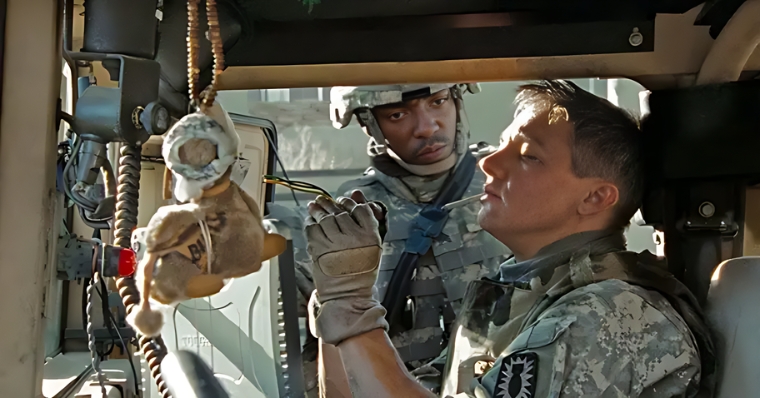
The Hurt Locker (2008)
Let's start with a milestone moment: Kathryn Bigelow, a name now etched in Hollywood folklore as the first woman to ever snag a golden Oscar statuette for Best Director. She broke the ceiling and shattered the glass. However, you want to phrase it in 2010 with her groundbreaking film "The Hurt Locker." And who better to lead the cast than Jeremy Renner, whom you may recognize as Hawkeye, and Anthony Mackie, also known as Falcon from "Falcon and the Winter Soldier"? They immerse themselves in the roles of U.S. Army bomb squad members navigating through the difficult landscapes of Iraq. Bigelow didn't just dip her toes into a male-dominated genre; she cannonballed right in. With a directorial flair honed to precision, she crafted a war film that went far beyond the cacophony of bullets and bombs. She dissected the multi-layered facets of warfare, diving headfirst into the murky waters of human emotion and conflict psychology. The genius of Bigelow isn't just in capturing the mechanics of a high-stakes job—it's in unraveling the complex human psyche behind each choice, each cut of a wire, each tick of the bomb clock. It's as if she took the genre and spun it on its axis, focusing the camera lens not merely on the clash of arsenals but on the often-overlooked, raw human element that powers every battle. If you think war movies are all about battlefield exploits and macho heroics, "The Hurt Locker" challenges you to think again. It whispers in your ear that human souls struggling with inner turmoil and moral quandaries lie beneath the protective armor and behind the scopes of sniper rifles. It's an intimate portrait painted on a sprawling canvas of conflict and chaos. So, suppose you're interested in exploring the depth of human emotions skillfully intertwined with intense, pulse-pounding action. In that case, you'd be hard-pressed to find a better guide than Kathryn Bigelow's "The Hurt Locker." A masterpiece? Undoubtedly. A game-changer? You better believe it.
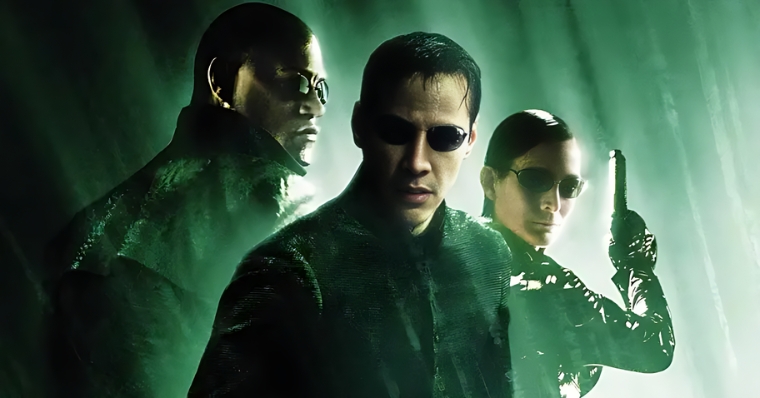
Matrix (1999)
"Matrix" is not just another title in the annals of cinema; it's a cornerstone of pop culture. If you've never heard the term' Matrix,' you might just be living under a rock—seriously. Whether it's the iconic red and blue pills, the sleek leather get-ups, or the awe-inspiring bullet-time effect that set a new VFX standard, this 1999 sci-fi extravaganza has unquestionably left an indelible mark on the world of film. And steering this ship through uncharted waters was none other than the visionary directors Lilly and Lana Wachowski, affectionately and professionally referred to as the Wachowski Sisters. Let's delve into the stars for a second. We've got Keanu Reeves, who is also famous for his role as John Wick, at the forefront. He brings to life Neo, a hacker-extraordinaire, suddenly flung into the startling revelation that his reality is, well, unreal. His life is trapped in 'the Matrix,' a simulated realm created to fool humans into believing they live in a genuine world, a subjugation of the mind that borders on the dystopian. Yet, what propels "Matrix" into the stratosphere of cinematic brilliance isn't just its groundbreaking storytelling; it's how the Wachowski Sisters infused the film with philosophical musings that could make even Socrates stop and ponder. The movie isn't merely an adrenaline-pumping joyride through a landscape of bullets and bending spoons; it's a metaphysical journey through existentialism, questioning reality, free will, and human consciousness. It makes you ask what you know—or what you think you know—about the world around you. The action sequences, meticulously choreographed, are equally enthralling and take your breath away—sometimes quite literally. It's the kind of film that had people exiting theaters at the turn of the millennium, awestruck, pondering the very fabric of existence and likely questioning if their nine-to-five grind was a part of some grand simulation. What adds a cherry on top is that this masterpiece laid the foundation for one of the most beloved and enduring franchises in movie history. Even decades later, its influence doesn't just linger; it reverberates throughout the film industry, setting a high bar for storytelling, visual effects, and thematic depth. So, if you want a film that defies genre norms and elevates the conversation—literally and metaphorically—look no further than the Wachowskis' "Matrix." It's not just a film; it's a cultural phenomenon that has shaped cinematic narratives and techniques for years to come. And given its enduring legacy, it seems poised to do so for many more years.
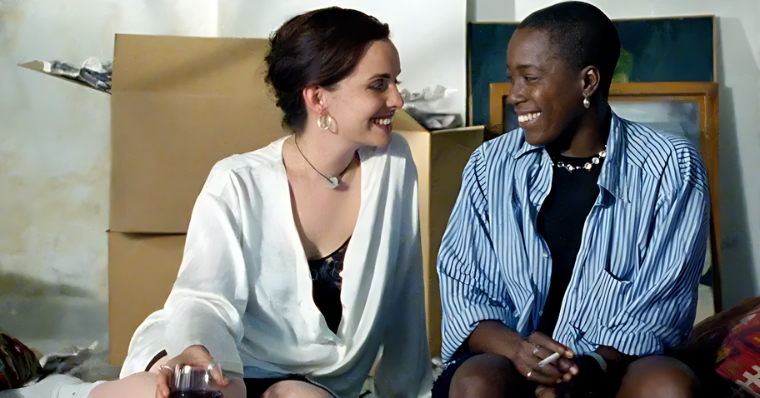
The Watermelon Woman (1996)
If you're looking for a groundbreaking film that seamlessly intertwines queer cinema with the narrative of Black female representation, then "The Watermelon Woman" should sit atop your must-watch list. Released in the waning years of the 20th century, this film serves as both a unique narrative and a meta-commentary on the very subject it deals with. You might say it's a movie within a quest to make a movie, a bit like Russian nesting dolls, but with layers of cultural and social significance. Here's the intriguing setup: Cheryl, portrayed by director Cheryl Dunye herself, is a young Black lesbian aspiring filmmaker. She's entranced by the life and mystique of the Watermelon Woman—a Black actress from Philadelphia who gained fame in the 1930s under this pseudonym. Cheryl embarks on an audacious journey to make a film about this enigmatic figure, challenging both norms and expectations along the way. Now, let's not gloss over the brilliance here. The movie fuses fiction with reality and uses this narrative structure to delve deeply into the complexities of how Black women are portrayed in film and media. The layers run deep, like concentric circles, each exploring different facets of identity, representation, and societal norms. What makes "The Watermelon Woman" especially riveting is its timing. In an era where the discourse surrounding the representation of Black women and queer characters was often swept under the rug or blatantly ignored, this film decided to break the ice. It shattered the silence and dug into topics considered taboo at the time. Think of it as both a product and critique of its era, making it a film that was years—perhaps even decades—ahead of the cultural curve. But it doesn't stop there. As Cheryl embarks on her cinematic journey, the audience gets an insider's look at the challenges, triumphs, and undeniable complexities that come with exploring themes so often marginalized. Cheryl's endeavor becomes our endeavor. We feel her setbacks, share her revelations, and ultimately bask in the significance of her artistic venture. In essence, "The Watermelon Woman" stands as a milestone in the annals of feminist cinema. But it's not just that. It's a clarion call that addressed issues of race, sexual orientation, and gender long before these conversations echoed loudly in our cultural zeitgeist. As such, it's a film that was daring in its day and remains profoundly relevant now, embodying the spirit of storytelling that challenges, enlightens, and invites us to re-examine the world in which we live. So, if you're into films that push boundaries, create dialogues, and dare to question what many take for granted, "The Watermelon Woman" deserves your attention. And not just a cursory glance, but an engaged, thought-provoking kind of attention that resonates long after the credits roll.

Barbie (2023)
"Barbie" (2023) is no ordinary addition to the silver screen. It's far more than just a celluloid transformation of a world-renowned doll. Headlined by Margot Robbie, who you might know from cinematic adventures like "Babylon" or "Birds of Prey," this eye-popping, candy-colored spectacle comes under the skilled direction of Greta Gerwig. Yes, the same Gerwig whose fingerprints are all over masterpieces like "Lady Bird" and "Little Women." Gerwig's journey as a director has been meteoric, to say the least. Starting as an actress, she's navigated her way into the director's chair, and man has she left an impression. "Barbie" is a crown jewel in her already-stunning filmography, breaking records left and right. We're talking about a successful movie that Gerwig now holds the enviable title of helming the most profitable film by a female director in U.S. history. Can we say 'iconic'? Now, onto the technical chops of the film. It's not just a visually indulgent experience. We're talking costumes designed by two-time Oscar winner Jacqueline Durran, set designs by six-time Oscar nominee Sarah Greenwood, and glossy cinematography by three-time Oscar nominee Rodrigo Prieto. Think again if you've seen it all in one sitting. The attention to detail is so fine-tuned that multiple viewings are practically mandatory, and each one reveals a new layer of craftsmanship. Yes, it's that complex. What makes "Barbie" genuinely compelling is its narrative audacity. The tale starts in Barbieland, a bubblegum utopia where Margot Robbie's Barbie faces an existential crisis and journeys into the real world to find her authentic self. Accompanying her is Ken, portrayed by none other than Ryan Gosling. This exploration combines fantasy and reality, a thematic concoction that stirs up memories of mind-benders like "The Truman Show" and "The LEGO Movie." But wait, there's more. The movie isn't just about trips and pink convertibles. It also takes a stand on critical societal issues. Remember how Barbie's proportions have always sparked controversy? Well, Gerwig addresses that while celebrating Barbie as a feminist icon. It's a clever juxtaposition that works wonders for both long-time Barbie fans and social justice advocates. When it comes to performances, Margot Robbie doesn't just hit the nail on the head; she obliterates it. Her Barbie is a symphony of exaggerated optimism and layered emotional complexity. And as for Ryan Gosling, let's just say he brings new meaning to the term' scene-stealer.' His interpretation of Ken adds dimensions to a character once regarded as merely an accessory in Barbie's world. Oh, and let's not forget the ensemble. It's studded with stars like Kate McKinnon, Issa Rae, Alexandra Shipp, and America Ferrera, all bringing a unique flavor to this cinematic smorgasbord. They are like the cherries on top of an already overloaded sundae. Yet, despite its kaleidoscopic ambitions, the movie has its inconsistencies. It occasionally halts its whirlwind pacing to delve into more serious matters, sometimes feeling like it's caught in an identity crisis of its own. It's like attending a party where the music suddenly stops, and the host starts reading philosophy. Confusing but somehow still mesmerizing. Ultimately, "Barbie" does more than entertain; it triggers conversations. It's a film that challenges as much as it amuses, blending satire with genuine human emotion. This isn't just a movie; it's an experience. So, if you're in for a treat that tantalizes both the eyes and the mind, "Barbie" is a no-brainer. Watch it; you'll walk out of the theater with much more than just a ticket stub.
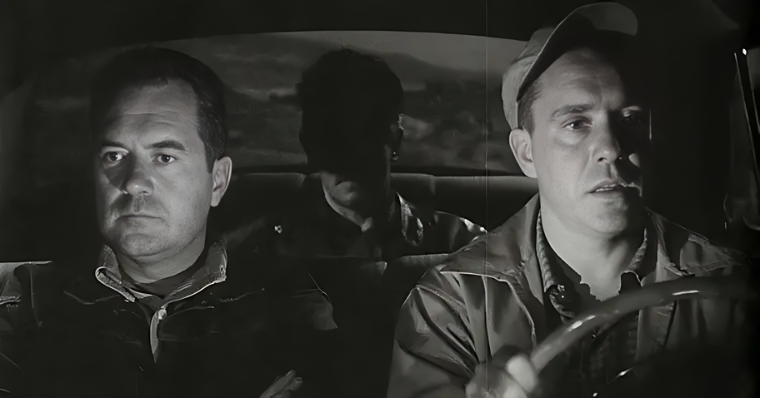
The Hitch-Hiker (1953)
"The Hitch-Hiker" (1953) is a pivotal marker in cinematic history. What sets it apart in the noir landscape that dominated the silver screen in the '40s and '50s? Well, it has an ace up its sleeve: the film was directed by Ida Lupino, a woman of many talents—actress, director, and producer. Her influence wasn't just a footnote; she etched her name in the annals of Hollywood for her groundbreaking strides in an industry notoriously dominated by men. Now, let's talk about Lupino. This trailblazer wasn't just your garden-variety talent; she was one of the first women to gain prominence as a director in the United States. Her filmography is a roster of hits, weaving a legacy that has stood the test of time. Among her lauded projects is "The Hitch-Hiker," a quintessential noir flick, an atmospheric masterpiece that traps its audience in a web of tension and suspense. The plot might sound straightforward, but hold onto your armrests; it's anything but. "The Hitch-Hiker" spins a dark tale of two buddies heading out on a seemingly innocent fishing trip. The tension kicks in when they make the fateful decision to pick up a mysterious hitchhiker. Spoiler alert, but not really: this stranger is a sociopathic fugitive. Cue ominous music because their innocuous offer of a ride spirals into a dangerous game of cat and mouse, throwing them into a perilous situation that would give anyone second thoughts about being a Good Samaritan ever again. The film explores the darkest recesses of the human psyche, presenting an unsettling but fascinating look at how a chance encounter can lead to life-altering, hazardous circumstances. It's more than a suspenseful narrative; it's a lesson in human vulnerability and the ever-present shadow of malevolence that can darken even the most sunlit fishing trips. The suspense isn't just confined to dark alleys and smoky bars typical of noir; it invades the everyday spaces, reminding us that danger can lurk in the most unexpected corners. Ida Lupino's prowess in storytelling is on full display here. The ambiance, the pacing, and the way each shot seems to contribute to an escalating sense of dread—it all amounts to a visceral cinematic experience. Her innovative storytelling techniques captured an authentic sense of fear and uncertainty, and in doing so, she breathed new life into a genre steeped in tropes and predictability. In an industry that didn't make it easy for women to climb the ladder, Lupino kicked the ladder away and built her own staircase. "The Hitch-Hiker" cemented her reputation as a formidable director and demonstrated that narrative ingenuity knows no gender. It challenges the norms of its genre and the status quo of its time, offering a palpable tension that's as timeless as the societal norms it tacitly critiques. So, if you're eager to delve into a film that's as much a social commentary as it is a thrill ride, give "The Hitch-Hiker" a watch. It's not just a movie; it's a conversation starter, a thought-provoker, and a nail-biter. Trust me, you'll be on the edge of your seat, rethinking every car ride you've ever offered or accepted.
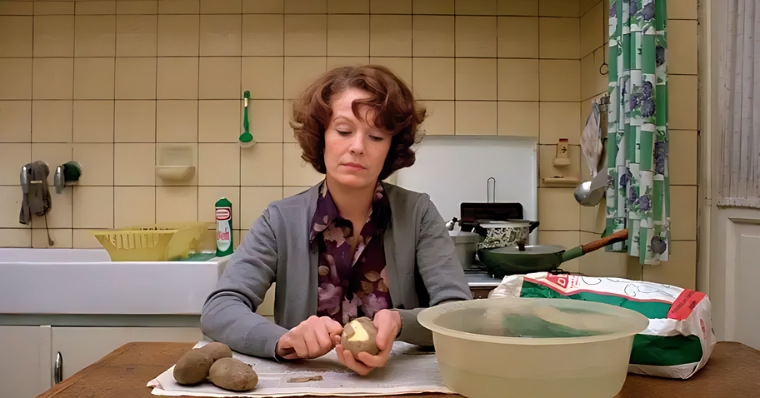
Jeanne Dielman, 23, quai du commerce, 1080 Bruxelles(1975)
Crowned the best film of all time by the esteemed film journal Sight & Sound in their 2022 list, "Jeanne Dielman, 23, quai du commerce, 1080 Bruxelles" is an absolute jewel in the career of Belgian filmmaker Chantal Akerman. Can we pause and acknowledge the audacity here? She was a mere 25 years old when she directed what has since become her magnum opus. In the midst of an era when the film industry was essentially a men's club, Akerman flips the narrative. "Jeanne Dielman" serves as a slow-burn exploration into the life of a solitary widow living with her teenage son. Now, what's exceptional here is not just the depiction of domesticity; it's the meticulous, almost OCD-level routine Jeanne has curated for herself. She knows her day down to the minute as she juggles house chores and—brace yourselves—moonlights as a prostitute to make some extra cash. The fascinating narrative, however, isn't the sole champion of this film. Delphine Seyrig, the lead actress, deserves a standing ovation, not just for her raw performance but for embracing a character so nuanced and complex. Seyrig's portrayal elevates the film to a level that doesn't just echo in the chambers of cinema history; it rattles them. It's a shout, a roar, a seismic wave in the cultural narrative. What makes this film a genuine standout isn't just Akerman's prodigious direction; it's the way the movie utilizes time and space from a distinctly feminine perspective. This is a crucial point, mind you, because these are dimensions so often erased or, at the very least, marginalized by a patriarchal society. Here, the mundane tasks, often attributed to 'women's work,' are not just presented; they're practically meditated upon, placing the female experience front and center without apology. Now, why is the film still discussed today, you ask? Well, "Jeanne Dielman" isn't just another film in the ever-growing canon of cinema; it's a societal commentary . It's a high-octane, intellectual dialogue about the duality of a woman's life that intersects domesticity with sexuality. Akerman's voice in this piece is like an inextinguishable flame that keeps burning, illuminating areas often left in the dark by conventional storytelling. The film takes on even more layers when considering it as an avant-garde feminist text that challenges societal norms, offering a heady mix of existential despair and banal realism. So, for those keen on delving into an authentic cinematic experience that's a harmonious blend of breathtaking direction, exceptional acting, and sociocultural commentary, this film by Akerman is an indispensable artifact. "Jeanne Dielman" is more than a film; it's an experience, a critique, and a lesson in pushing the narrative boundaries. No hyperbole. It's not just a reflection on screen—it's a mirror held up to society. And you know what? It's one we all need to look into.
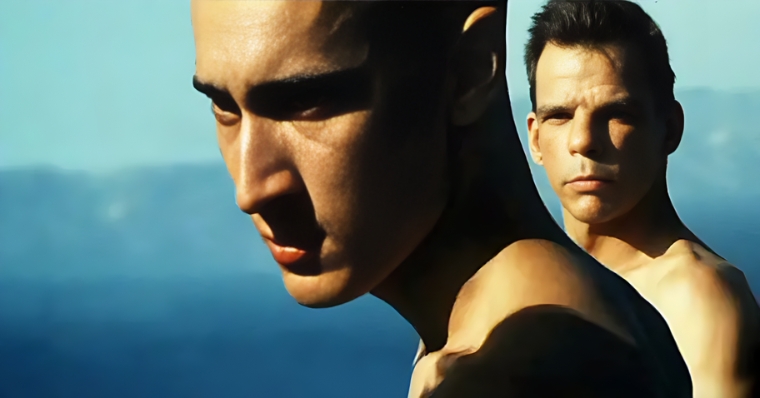
Beau Travail (1999)
Claire Denis, the French filmmaker, has become somewhat of a household name not just in the context of French cinema but in the broader realm of filmmaking as a whole. Her work is practically a treasure trove of disruptive and incendiary films. And if you're talking about cinema crafted by women, her name is essentially unavoidable. It's like talking about basketball and pretending Michael Jordan never picked up a ball. One of her works that truly demands a spotlight is "Beau Travail." "Beau Travail" has been hailed by many critics as one of the best films ever made and as Denis's tour de force. Just for context, the narrative is loosely inspired by the Herman Melville novel "Billy Budd," yes, the same guy who gave us the ever-ubiquitous tale of "Moby Dick." The plot whirls around French Foreign Legion soldiers who find themselves in the trenches of rigorous training in Africa. At the helm is Sergeant Galoup, portrayed by Denis Lavant. He's your archetypal military man—until a new recruit shows up and shatters the idyllic life he had so carefully constructed for himself. Now, let's take a step back and
Marvel at how Denis captures a stern and hostile atmosphere. It's a bit like watching a bee's nest from a distance; you're entranced, but you're fully aware of the impending sting. And sting it does. The film serves as a laser-focused lens on masculinity, delving deep into themes of jealousy, bitterness, and long-standing resentment. We've got an ecosystem where discipline rules supreme, and Denis orchestrates it all with the finesse of a seasoned maestro. But wait, there's more. Denis not only scrutinizes but also dissects, and that's what sets her apart. This is where she pulls all her magic tricks, the je ne sais quoi that's vaulted her into filmmaking royalty. In "Beau Travail," she explores and excavates the layers of manhood within the authority framework. Through her lens, the audience is led down a rabbit hole that spirals into the psyche of the human condition, all while keeping you glued to your seat. So, why is "Beau Travail" such a hot topic? It's not just a film; it's a psychological venture that prods the audience to question societal norms. Denis practically serves you the unsettling nature of masculine pride on a silver platter. It's like being handed a Rubik's Cube that shows you the complexities of human relationships through its myriad colors, no matter how you twist and turn it. In short, "Beau Travail" isn't merely a cinematic achievement; it's a cultural revelation. It provides an unvarnished look at the dichotomies of human nature in a confined setting. Claire Denis confirms, yet again, that she is not just a filmmaker but a storyteller, a philosopher, and, let's just admit it, a genre unto herself. So, if you're keen on exploring a multi-dimensional cinematic experience that picks apart the fragile intricacies of ego and authority, look no further. This film is a masterclass.
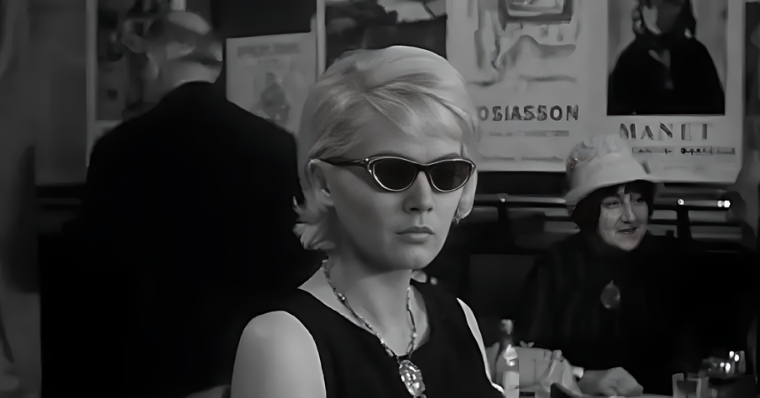
Cleo from 5 to 7 (1962)
When you discuss groundbreaking women in film, skipping over Agnès Varda is like talking about rock music without mentioning The Beatles. It's just not done. Originally hailing from Belgium, Varda became an inescapable force in French cinema, spreading her creative flair far and wide enough to influence an entire generation of filmmakers globally. One film that solidified her status as a cinematic savant is "Cleo from 5 to 7," a piece so pivotal that it claimed a prime spot in the French New Wave—a movement mostly reigned over by the men's club, with stalwarts like Jean-Luc Godard steering the ship. But let's dive into the hypnotic whirlpool that is "Cleo from 5 to 7." The film shadows a singer named Cleo, who roams the labyrinthine streets of Paris as she waits for the results of a potentially life-changing medical test. While drowning in a sea of anxieties and existential what-ifs, she stumbles upon a young soldier on the brink of deployment. And guess what? Their random encounter triggers a cascade of unforeseen events that's less happenstance and more serendipitous chaos. The film practically vibrates with palpable tension, akin to a coiled spring ready to snap. You're on the edge of your seat but don't even realize you're leaning in. And here's the kicker: Varda's storytelling lens gives us a female gaze that was sorely missing in French cinema. She subverts the dominant tropes of the New Wave era, flinging open a door for narratives centered around women to not only exist but to flourish in a male-dominated space. It's like she tossed a grenade into an old boys' club and then casually strolled away, letting the landscape reorganize itself in her wake. Take a moment to wrap your head around that. It's not just that she broke the glass ceiling; she practically redesigned the whole building. She challenged long-standing cinematic norms with what could only be described as a certain artistic audacity. For instance, the camera doesn't just follow Cleo; it becomes almost an empathetic extension of her, capturing her inner tumult and external world in real time. You're not merely an observer; you're an emotional accomplice. In the grand scheme of cinematic history, what Varda accomplished with "Cleo from 5 to 7" was a watershed moment. It wasn't just a 'good movie'; it was a sociocultural statement that sent ripples through the movie-making community. It set the stage for future explorations of female subjectivity on screen. Think of it as a masterclass in how to be a renegade while staying true to artistic intent. So, if you find yourself searching for a film that's more than just weekend binge-watch material—a film that marries compelling storytelling with a daring reconfiguration of the norms—look no further. "Cleo from 5 to 7" will not just entertain you; it will grip your conscience and perhaps make you question the very dynamics of narrative perspectives you've been fed thus far. Trust me; this one is not just another flick; it's a seismic event in movie history.
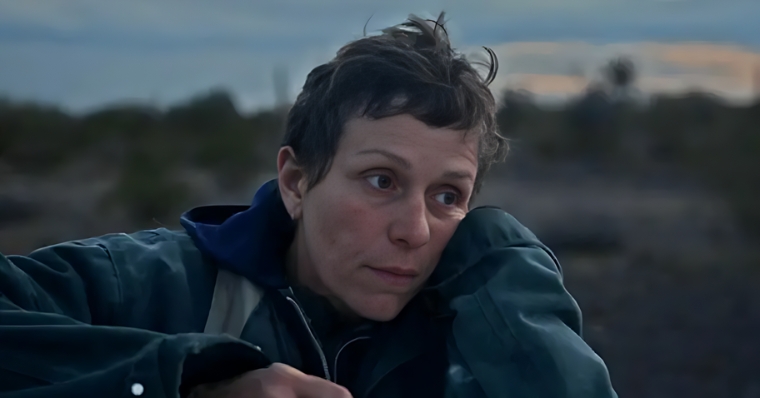
Nomadland (2020)
Talk about a cinematic masterpiece that had everybody and their grandmother buzzing at the 2021 Oscars. "Nomadland" wasn't just another entry; it was a tour de force. You probably already know about Frances McDormand, who absolutely killed it in her role. If you saw her in "Fargo," you knew she wasn't playing around. She brought down the house and picked up the Best Actress Oscar while she was at it. But the real revelation of the night? None other than the director, Chloé Zhao. Hold on to your seats because this is where the plot thickens. Zhao didn't just win Best Director; she bulldozed her way into the history books. In the 93rd Oscars, she became the second woman ever to clinch that golden statuette in the directing category. And hold on because the glass ceiling is shattering even further—she's the first Asian woman to snag this hyper-competitive award. In an industry where names like Spielberg and Scorsese reign supreme, this was akin to spotting a rare celestial event in Hollywood's often monochromatic sky. Let's pivot to the film itself. "Nomadland" unfolds the odyssey of a woman who loses virtually everything—her economic security, her social tether—in the unforgiving maelstrom that was the late-2000s Great Recession. Stripped down to the basics, she hits the road, crisscrossing the American West in a van as a modern-day nomad. The narrative doesn't just examine her life; it provides a magnifying glass into a subculture that most of us never even ponder. This isn't a Hallmark card version of life on the road; it's raw, intricate, and emotionally resonant. Zhao transforms what could have been a grim tale of despair into an exquisite tapestry of human resilience. What's her secret sauce? She paints a textured panorama that you almost forget you're watching a movie. There's no sugar-coating; you get exposed to the bare, sometimes uncomfortable reality. But Zhao's lens never deviates from the dignity of her characters, even when they're at the bottom of their luck. This isn't poverty porn; it's a human story told with finesse. And then there's the cinematography. Each shot seems meticulously crafted to echo the emotional beats of the story. Visual storytelling at its best, where even the vast landscapes seem to carry the weight of solitude and longing but also, paradoxically, of liberation and infinite possibilities. This is not just a 'movie night' flick. This is one of those rare films where you walk out of the theater—or move away from your streaming device—and feel like your worldview has subtly shifted. Like, you're compelled to re-evaluate what freedom means in the context of modern-day America, what it means to live unencumbered by societal norms truly. Bottom line? "Nomadland" was no ordinary film, and it didn't win all those Oscars for nothing. It's a masterful intersection of evocative storytelling, cultural commentary, and exquisite film craft. So, if you're in the mood for a cinematic experience that offers both emotional complexity and unflinching realism, you can't go wrong here. Zhao and McDormand have created something far more than a movie; they've crafted an experience that's a mirror reflecting not just individual lives but an entire forgotten corner of American society.
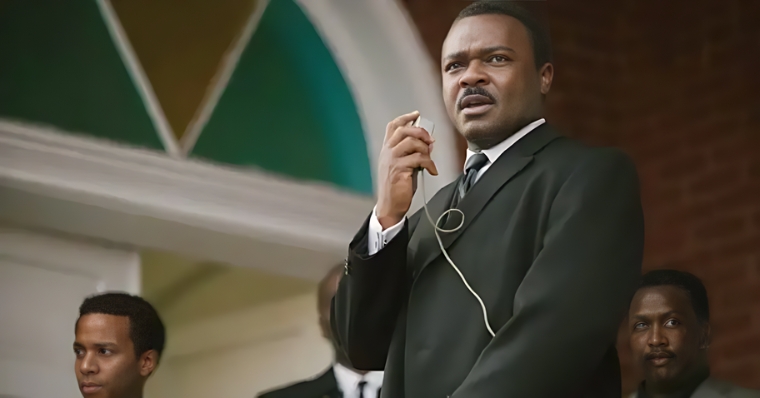
Selma (2014)
Roll out the red carpet for a groundbreaking film that's not just a flick you casually Netflix and chill to: "Selma" (2014). We're diving deep into the cosmos of Ava DuVernay, a name that should ring bells. If you've been living under a rock and don't know her, you should. She's the maestro behind the critically adored miniseries "When They See Us" (2019), and her resume is basically a laundry list of works that have made both audiences and critics stand up and cheer. But let's get to the heart of the matter. DuVernay didn't just go for the moon; she went for the stars with "Selma," a cinematic biography of none other than Martin Luther King Jr., a man who needs no introduction. You know how they say you're only as good as your last hit? Well, this film escalated her rep to such lofty heights that she became the first Black woman to get a nod for the Oscar for Best Film and scored a Golden Globe nomination. To say that's a game-changer would be an understatement. The movie focuses its lens on a critical slice of time in MLK's life—namely, the 1960s. This isn't just a meander down any old memory lane; it zeroes in on the Selma to Montgomery marches, a series of epically momentous events that were essentially the Civil Rights Movement's own moon landing. We're talking about the visceral fight for Black civil rights in the United States, an era brimming with courage and fraught with tension. The stakes in this cinematic odyssey are sky-high, reflecting the real-world urgency of the Civil Rights Movement. MLK isn't depicted as some untouchable deity. Still, as a flesh-and-blood individual grappling with the weighty responsibility of being, Martin Luther King Jr. DuVernay's lens doesn't shy away from showing the grit, the grime, and the glory in vivid Technicolor. No, this isn't a two-dimensional portrait but rather a multi-faceted narrative. The emotional depth here isn't just skin-deep; it goes down to the bone. And let's give a standing ovation to the ensemble cast. They aren't just filling roles; they're incarnating spirits, bringing nuances to the table that are almost palpable. It's as if the celluloid itself is pulsating with the raw energy and profound import of the era it portrays. Now, let's give a nod to the technical craftsmanship. The cinematography and score work in tandem like a well-oiled machine, turning each frame into a canvas and each musical note into an emotional punctuation mark. This isn't just a movie; it's a crescendo of artistry that reaches its peak at the pivotal moments and even in the subtle in-betweens. Summing it all up, "Selma" is less of a film and more of a historical tapestry woven with threads of dramatic tension, political upheaval, and unparalleled human spirit. DuVernay didn't just make a movie; she etched a chronicle that's both an education and an experience. So, if you're up for a cinematic journey that goes beyond mere entertainment and ventures into the realm of living history, this is your golden ticket. From the Academy nods to the standing ovations, the acclaim is not just well-deserved—it's a statement that cinema, like history, is written by those brave enough to wield the pen.











